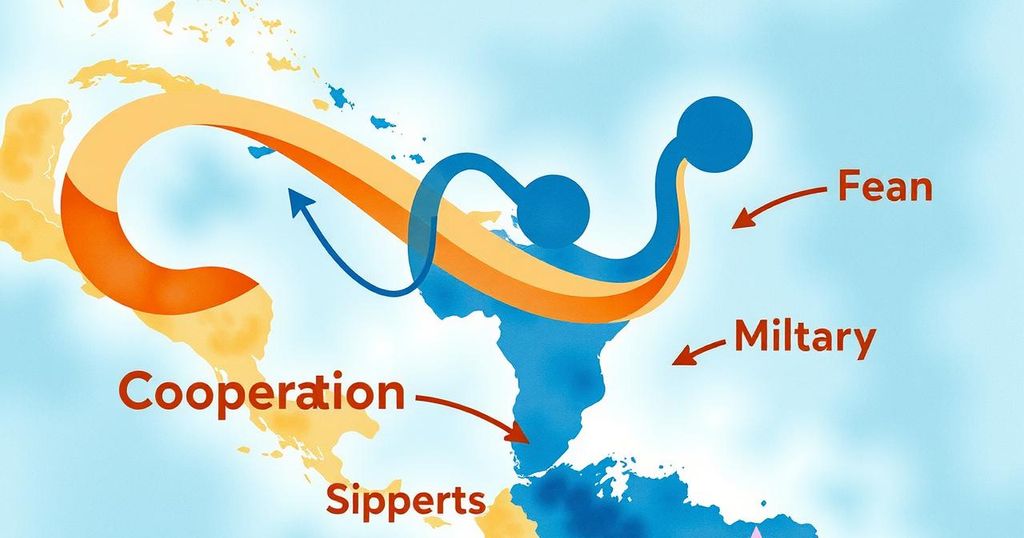As tensions escalate over the Essequibo Region, experts recommend that Guyana fortify its military capabilities and engage with CARICOM and the UN for support. Emphasis is placed on a cohesive diplomatic strategy alongside military readiness to deter Venezuelan aggression. A call for international advocacy and stronger public awareness campaigns is also stressed to ensure national unity in confronting territorial threats.
In the wake of increasing Venezuelan aggression regarding territorial claims to the Essequibo Region, Professor Mark Kirton of the Centre for International and Border Studies has urged Guyana to bolster its military capabilities. He emphasized the need for enhanced diplomatic engagement in tandem with improvements in maritime, aerial, and ground defense systems. Kirton made these statements during a symposium on the Guyana-Venezuela border dispute at Cipriani College of Labour and Cooperative Studies in Trinidad.
Professor Kirton posits that security, constituting the fourth pillar of the Caribbean Community (CARICOM) Revised Treaty of Chaguaramas, necessitates a regional response. He suggested that CARICOM might benefit from enlarging the Regional Security System and organizing a military observation mission within Guyana. Furthermore, he recommended that CARICOM should collaborate with the United Nations (UN) to establish a military presence aimed at deterring Venezuelan incursions that violate international law.
He stated, “CARICOM should consider joining Guyana in a joint approach to the United Nations, to seek the establishment of a multilateral military mission in support of local forces as a multinational force which can act as a deterrent to a possible incursion into Guyanese territory.” Kirton highlighted the potential for the Caribbean Regional Security System to assist Guyana in maintaining territorial integrity during escalating tensions.
In response to challenging regional dynamics, former Guyanese Foreign Affairs Minister Carl Greenidge noted the importance of seeking foreign military assistance without compromising national security. He supported Kirton’s concept of a multinational military force to protect Guyana’s territorial sovereignty. He acknowledged logistical challenges in mobilizing resources rapidly while expressing concern over Venezuela’s military enhancements, supported by nations such as Iran.
Greenidge criticized the Community of Latin American and Caribbean States (CELAC) for its silence amid Venezuelan provocations, representing a potential diplomatic shortfall for Guyana. He noted that during recent Venezuelan border incursions, CELAC had made no commitments to supporting Guyana, indicating a need for reassessment of diplomatic strategies.
Professor Kirton also flagged the necessity for consistent updates to the United Nations Security Council regarding threats to international peace. He recommended that Guyana engage more proactively with Brazil, emphasizing its diplomatic history and experience in peacekeeping missions. Additionally, he suggested leveraging various Caribbean organizations to rally awareness and support for Guyana’s position on its territorial disputes.
Kirton called upon CARICOM and other state members to offer comprehensive support for Guyana’s sovereignty amidst ongoing challenges. He noted that despite individual national interests, the region should remain united to uphold international law.
Regarding domestic preparedness, Kirton advocated for the establishment of an analytical unit composed of professionals to develop strategic policies pertinent to national security concerns. The aim is to ensure public clarity and unity in response to external threats. This initiative includes ongoing public education to counter misinformation and foster a cohesive national stance.
Referring to recent violent incidents involving Venezuelan forces, Kirton asserted that these actions may signify a geopolitical test of regional stability. He expressed concerns about Venezuela’s intentions to hold elections in the disputed Essequibo Region, which further escalates tension leading up to Guyana’s independence anniversary.
Above all, Kirton stressed Guyana’s need to advocate for international legal support, exemplified by the request for directives from the International Court of Justice to prevent Venezuela from pursuing its claims and elections within the disputed territory. Attaining recognition for its legitimate claims remains crucial for Guyana’s long-term security and stability.
In summary, the increasing threats posed by Venezuelan military actions necessitate a strong and multifaceted response from Guyana, encompassing both military preparedness and enhanced diplomatic initiatives. Professors Kirton and Greenidge emphasize the importance of regional cooperation and international support through Caribbean organizations and the United Nations. Guyana must also undertake strategic measures domestically to promote public unity and enhance its geopolitical standing in the ongoing border dispute with Venezuela.
Original Source: demerarawaves.com






